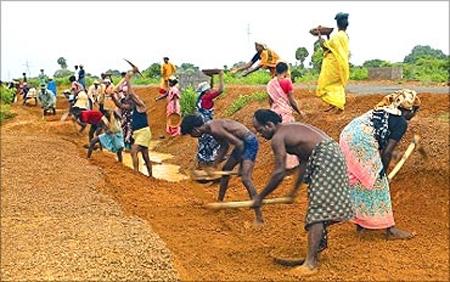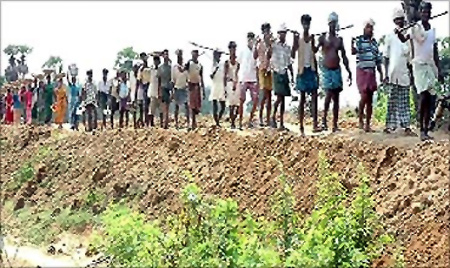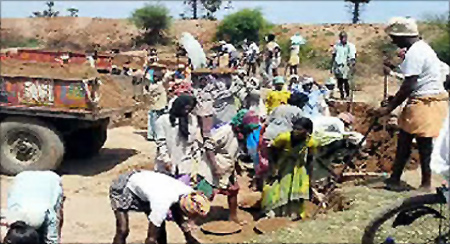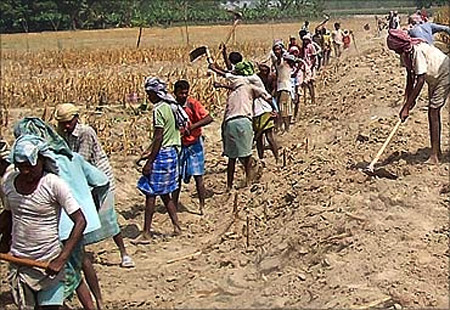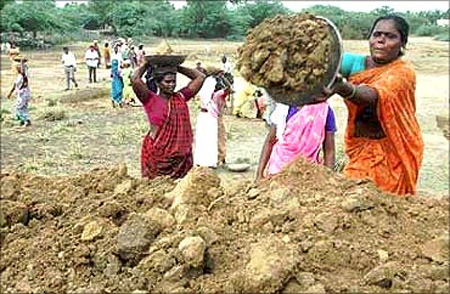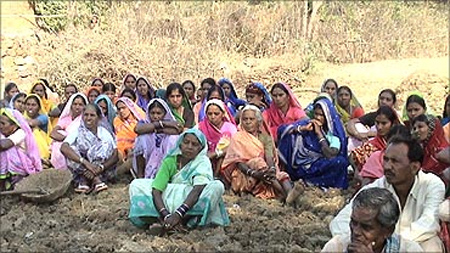 | « Back to article | Print this article |
Why Kejriwal calls NREGS a joke
NREGS has no place in the scheme of things that Kejriwal prescribes for the nation in his book Swaraj, says Sreelatha Menon.
The National Rural Employment Guarantee Scheme (NREGS) is the only grand Central scheme that anti-corruption activist Arvind Kejriwal mentions in his book Swaraj - which calls for scrapping all Central schemes.
NREGS was pushed by Kejriwal's mentor Aruna Roy, who has not exactly backed the anti-corruption movement, or its present political avatar.
Leaving differences with Roy aside, his problem with the scheme – which he calls "a joke" – does not concern its provisions, but its very existence as a scheme "formulated at the Centre or the state capitals".
The problem, he says, is that the "funds under these schemes flow from the top to the bottom".
Click NEXT to read more...
Why Kejriwal calls NREGS a joke
"Each official is hell-bent on spending money at his level only. That money, which is meant for the welfare of the people at the lowest rung, never reaches them," he writes.
"How can money be siphoned off at all levels is a question that comes to the mind so very often? One of the biggest reasons is that there is no accountability of any government official. This is what needs to be corrected," he writes, and adds, "The villagers do not need these schemes, but need free funds."
Instead of sending Rs 4 crore (Rs 40 million) or Rs 5 crore (Rs 50 million) to a village under a particular scheme, let the government send less money, say Rs 3 crore to the village, but not tie it to any scheme, and the villagers be allowed to use it according to their needs, he says.
Click NEXT to read more...
Why Kejriwal calls NREGS a joke
Instead of joint secretaries of the rural development ministry, deciding from Delhi, how much funds under NREGS should be go for water-harvesting, irrigation and so on, untied funds would enable a gram sabha to jointly decide how much money is needed for irrigation and how much as widow pension; how much money should be spent on education and how much on health care, he says.
This is a fact that the government has been considering for decades under the Planning Commission - but without doing much about it. This year, some Central schemes are being clubbed together, while a small proportion of the 12th Five-Year Plan funds are being sent untied to the states.
Click NEXT to read more...
Why Kejriwal calls NREGS a joke
Kejriwal wants a reversal of this, so that the scheme funds become a small part of the total untied funds. He wants that the criterion for allocation should be decided at the gram sabha level, thus making all poverty lines drawn by various committees appointed by the Planning Commission unnecessary.
"The villagers will decide criteria that categorise one below the poverty line (BPL). In Hong Kong, a person without an air-conditioner is treated as BPL. In Delhi, a rickshaw puller is able to make Rs 5,000 a month, and is still not able to make ends meet. He is forced to live in shanties in dirty surroundings. But Rs 5,000 is enough in a village where that same person can live decently," he writes.
Click NEXT to read more...
Why Kejriwal calls NREGS a joke
If it is left to the people, many innovative schemes could come up and villages could become self-sufficient, he feels.
He cites the example of village Kuthambakkam near Chennai where chemical engineer Ilango, the sarpanch for the last 15 years, has been working on making the village self-sufficient.
Ilango has enabled villagers to produce and sell all grocery items needed by the village, thus gather all the money spent on groceries as revenue. Another village in Pune started a grain bank and pulled people out of debts.
Click NEXT to read more...
Why Kejriwal calls NREGS a joke
"All schemes of the government should be stopped. These schemes get entangled into a complicated web of government officials at the village and state levels, powerful bureaucrats and their political masters, who are neither accountable to the people nor can be prosecuted. Only 10 per cent of the money under these grand schemes reach the people and the remaining is lost or embezzled in transit," he writes.
He says if all the government schemes are stopped, and free funds are made available to gram sabhas, "a revolution will come in the country that can erase poverty, hunger and unemployment".
